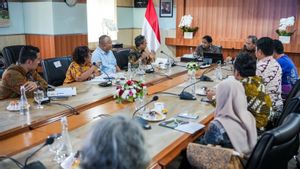JAKARTA - The majority of young people in DKI Jakarta are apparently not satisfied with the performance of President Joko Widodo (Jokowi).
This is based on the results of a survey found by Indonesian Political Indicators, entitled ’Survei Nasional Suara Anak Muda Tentang Isu Sosial-Politik Bangsa’.
This survey was conducted between March 4 and March 10. The survey was conducted using telephone contacts to 1,200 respondents aged 17-21 years with a survey margin of error of approximately 2.9 percent at a 95 percent confidence level.
Executive Director of Indonesian Political Indicators Burhanuddin Muhtadi said as many as 61.7 percent of youth respondents in DKI Jakarta said they were dissatisfied, even dissatisfied at all with Jokowi's performance. Meanwhile, only 35.8 percent said they were satisfied.
"Young people in which segment are not satisfied. The majority of young people in DKI are not satisfied," said Burhanuddin in his presentation online, Sunday, March 21.
However, nationally, youth respondents' trust in Jokowi's performance was quite high, namely 58.6 percent. Meanwhile, the general public who are satisfied with Jokowi's performance is 57.8 percent.
Meanwhile, youth respondents in Sulawesi, Minang ethnicity, and elementary school education and below have a balanced level of satisfaction with Jokowi's performance.
In total, said Burhanuddin, respondents who were satisfied and very satisfied with Jokowi's performance reached 65.4 percent.
"So the level of satisfaction (with Jokowi's performance) between the general population and young people is around 65 percent. This satisfaction is relatively balanced with public opinion in the survey last February", he explained.
In this survey, young people who became respondents also mentioned several things that had to be resolved. As many as 26.3 percent thought the COVID-19 pandemic problem had to be resolved.
"Most considered urgent (to be resolved, red) is the handling of the coronavirus outbreak. Then other problems related to the economy such as economic growth, poverty, and unemployment. Then the problems related to corruption and education", he concluded.
The English, Chinese, Japanese, Arabic, and French versions are automatically generated by the AI. So there may still be inaccuracies in translating, please always see Indonesian as our main language. (system supported by DigitalSiber.id)













